- Home
- Mollie Cox Bryan
Scrapbook of Secrets Page 4
Scrapbook of Secrets Read online
Page 4
“I’ll let you know. I promise. But for now, I need to go and say good-bye to the boys.”
She cracked open the door—as she often did, just to watch the boys while they didn’t know she was watching—they were both coloring while lying on their stomachs. Ben’s elbows formed triangles against the blue carpet. Sam was so intent on staying in the lines; his tangled dark brown hair was in desperate need of a good brushing.
“Boys,” she said in a low voice. They both looked up at her and dropped their crayons. She sat on the corner of the toddler bed. “I wanted to tell you both that I’m sorry I yelled.”
“Why did you yell?” Sam asked. “We just wanted to look at the pictures.”
“Those pictures are very special to me,” she said, and paused. “It’s like your blankies. You know how it’s hard to share them sometimes?”
“It’s okay, Mommy,” Ben said, and hugged her.
“It’s okay,” Sam said almost at the same time—and then both boys were in her arms. Warm boys. Her boys. Flesh of my flesh.
“Well, now, I’m going out for a while. Will you be good boys for Daddy?”
They both nodded their heads.
After the gift shop soaked her for thirty dollars for a small flower arrangement, Annie walked over to the information desk to see where Vera and her mom might be.
“Excuse me, please. Where might I find Beatrice Matthews?”
“Now, let’s see.” The receptionist looked at Annie through thick glasses, and then turned to her computer. “Room one-thirteen.”
“Thanks,” Annie said.
“Sure thing, hon,” she said in a warm voice as she looked back to her computer screen. Annie could hear her fingernails clicking on the keys. Why didn’t she cut those nails? How could she stand that?
Saturday night at the hospital: Annie noticed clusters of people around chairs. Some were sitting; some were standing. Others were drinking coffee and soda, eating snack machine potato chips. The very worst food for stress, Annie thought. She saw room numbers on the sign up ahead, with arrows pointing in both directions. She at least could still follow directions, she mused as she walked down the long hallway with barn paintings on either side of her.
Don’t these people ever get enough of barn art? As if there aren’t plenty of barns to look at in person, they have to have paintings everywhere with barns in them.
Her tennis shoes squeaked on the shiny floor as she turned the corner. Standing five-nine, Annie used to wear pretty little flats with her business suits. Flats that didn’t squeak on shiny floors—but these days, she was all about the sneakers and blue jeans. A brief flash of her old closet in D.C. came to her mind—all of the designer flats she had donned were lined up neatly. The Guccis were her favorite.
She thought she heard music as she approached room 113 and knocked lightly on the door. Vera answered.
“Well, hello, Annie. How lovely to see you,” she said, with a huge smile on her face.
Annie thought she smelled wine. As the door opened, she could see why. Four women were scattered through the room—each held a glass of wine, and one was pouring more. A huge platter of cheese and dark bread sat on the bedside table; a basket of muffins sat on the other side. One woman was reaching for the biggest blueberry muffin Annie had ever seen—not much smaller than Ben’s head.
“Mama is still in surgery,” Vera said as she grabbed Annie’s hands. “Let me introduce you. Well, now. You know Sheila.”
Vera moved her arm with the grace of a dancer—even now, in the hospital room, looking slightly haggard, she still held herself with such elegance.
“How are you?” Sheila came up to her and took the flowers out of her hand. Annie had never noticed how small and thin Sheila was. “Let’s see where we can put this. Oh, there’s a little space on the window shelf over there.”
Annie was shocked at how many flowers and plants were in the room. She smiled.
“This is Paige. She teaches history over at the high school,” Vera said, opening her arm to a slender, shaggy-haired blonde, with huge blue eyes, wearing a green tie-dyed T-shirt, which was a bit too tight and revealed an ample, freckled chest. The name “Paige” somehow didn’t suit. Annie had always thought of a “Paige” as having a more classic look. She looked more like a “Willow” or a “Star.” Annie shook her cool hand. “Pleased to meet you.”
“Likewise,” Paige said, turning back to the cheese plate. “Help yourself to some food.”
“I will, and thank you,” Annie said.
“And this is DeeAnn,” Vera said. “Owner of DeeAnn’s Bakery in town. Ever been there?”
“Oh, yes,” Annie said, politely shaking her hand. “Very good bread.”
“Thanks, but you need to try these blueberry muffins. I hired an intern and she just seems to have a way with the muffins. Good God, I can’t get enough of them,” she said.
She looked like a baker, Annie mused. Large, but not really fat; more muscular, with a little extra on those muscles. Huge hands and her forearms were sort of sculpted. Veins were popping out.
“Mama loves Vivaldi, you see,” Vera told her as she walked over to the boom box sitting on the floor. “We thought it would be nice for her to wake up to it.”
For such an event, Annie thought Vera would be a mess, but her blond hair was neatly brushed in its pageboy style and her makeup was flawless—of course, to Annie’s taste, it was a bit too much. The dark eyeliner, rouge, and lipstick looked a little like stage makeup.
“Now that you’ve met the scrapbook club, have a seat,” Sheila said, pulling up a chair and looking quite a mess, mousey brown hair barely combed, lipstick carelessly splashed on. “Oh, and have some pie. Do you want chocolate or apple?”
“Chocolate,” she replied. “Are we allowed to have wine in here?”
Vera shrugged. “I don’t see why not. We didn’t ask permission. Why would we?”
Annie sat in the chair and looked around at the group of women. For the first time since she had moved to Cumberland Creek, she felt the possibilities.
Chapter 6
Annie seemed completely unaware of her beauty, Vera mused as she looked at the new arrival enjoying a slice of chocolate pie. Beautiful, naturally curly, chestnut-brown hair, long eyelashes framing hazel eyes—and that skin, so smooth, wrinkle free. Those cheekbones—to die for. She sighed. The woman didn’t even wear an ounce of makeup. Vera closed her eyes as she sipped her wine and leaned back in her chair. She glanced over at the painting of morning glories climbing up a barn. No artist captured the brilliance of morning glories. She loved them. They grew all over her backyard and patio.
The purple of the morning glories always surprised Vera. Each morning, while having her coffee on the screened-in patio, it mesmerized her. There were other colors, some pleasant, some foreboding, that she reckoned with every morning. But the splash of purple offered a respite for her eyes, which feasted on the flowers—until her husband came bounding clumsily through the door, always making more noise than any one person ever needed to do for just the simplest of life’s maneuvers. Did he have to slam the screen door? Couldn’t he pick his feet up when he walked? Every morning, when he was home, it would happen—just yesterday, for example.
“Well, I’m ready to go,” he said, bending down to kiss her in the everyday, mechanical, see-ya-later kiss.
“I’ll see you in a couple of days,” she whispered back, and smiled at him. He looked for it—every morning.
“You’re not one to smile easily. The world has to work to get a smile from you,” he had said to her once.
Maybe that was true. But she did smile every morning.
It wasn’t as if she were unhappy, or so depressed that she wanted to kill herself, and, the way she looked at it, if anybody had a right to be depressed, she did. But that wasn’t it. She just felt flat. Nothing excited her anymore. This Maggie Rae death made her wonder how bad a person would actually have to feel to take her own life. Must be pretty damn bad.
“I’m glad I got my run in this morning,” Sheila said. “I probably won’t get to tomorrow.”
“You’ll live,” Vera said.
That damn running. Doesn’t she have anything better to do? Vera smiled—of course, she did. There was always the house to keep, the kids to feed, and yes, Sheila’s business, Creative Scrapbooking, which she ran out of her basement. But Sheila, insisting her run was where she had time for herself, carved it out every morning—right after her youngest was put on the bus to kindergarten.
Choices, thought Vera, they can make all the difference. And Sheila was in incredible shape. Vera thought about the choices that she had made in her life and the ones she didn’t get to make. Some things just are and there’s nothing you can do to change them.
She admired people with the clarity of mind that enabled them to make the right choices at the right time. She was always too pensive. By the time she’d make a decision, often things had changed.
She wondered how her life would have been different if, say, she had decided on a real dancing career in New York, instead of opening a dance studio in Cumberland Creek. Her business was one of the most successful in the county. Which really didn’t say much.
Vera ushered several generations of dancers through the door of her dance studio. Some of them went on to fame—or near fame. She followed their careers closely. They were almost like her children, since she did not have any of her own. She kept scrapbooks on all of them—and gave them to the dancers usually as a high-school graduation gift.
Now that she was in her forties, her dancing career would have assuredly moved into teaching. But instead, she taught all that time, her own passion for performing poured into her students. And a performance—once a year, at the recital—was something she looked forward to.
Her recitals were efficient masterpieces. One number after the next. Children lined up and ready to go. Plenty of adult supervision. She worked hard to get the right music with the right costumes with the right theme. And she saw to it that the production people were top-notch.
Vera was always complimented about the professional quality of her shows.
“Why didn’t you go on Broadway or something?” Sheila wanted to know at the last crop.
Vera shrugged. “There was Bill.”
“You mean he didn’t want you to do it?”
“Well, he never said so, not in so many words. But the hours that dancers work just don’t fit into the hours lawyers work. We’d have never seen each other, for one thing,” she replied.
“And that’s a bad thing?” one of the women said, and they all laughed. The subject was changed and Vera was grateful.
It wasn’t as if she kept secrets from her dearest friends. Some things were too private to talk about at a crop. After all, crops were primarily for scrapbooking. Oh, yes, the social aspect couldn’t be denied. But nothing deep or heavy should be broached.
Vera glanced at the clock and realized her mother had been in surgery for three hours. What was going on?
“You’d think they’d let you know something,” Sheila said, her coral lipstick long faded.
“I’m sure they will soon,” Paige offered, reaching for a muffin, her bracelets jingling as she did so.
Just then, the door opened and the doctor stepped into the room.
He looked tired, but he was smiling, with pleasant, deep creases framing his smile. “Are you having a party?”
“We just wanted to make it as pleasant for Mama as possible,” Vera said, standing.
“Well, I have good news and bad news. Your mom is fine—but the party will have to move into the hallway or go,” he said.
Vera sighed as she felt her heart race. She grabbed her chest, and then fell into Sheila’s arms. She felt unraveled suddenly, awash in emotion and tears and sweat, sobbing in relief.
“Vera?” the doctor said.
She turned to look at him.
“Have you been drinking?” He looked amused as he took in the scene of empty wine bottles and spent plates sitting around the hospital room.
“Well, of course, she has,” Sheila said, as if it were a matter of course.
“Well,” he said. “That’s a first. I was just going to suggest that you go on home and get some rest. But I don’t think that’s a good idea.”
“I’m not drunk, Doctor,” Vera said.
“But you’re not sober, either.”
“I’ll drive her home,” Sheila said, swaying a bit.
“No offense, but you’re drunker than she is,” he chided, but he was obviously amused.
Sheila placed her hands on her hip. “Now, look here—”
“I’ll drive them both home,” Annie spoke up.
“Finally a voice of reason,” said the doctor, looking straight in Annie’s eyes, with an obvious spark of interest.
Like most beautiful women, Vera noted, Annie completely ignored the doctor’s spark. That endeared Annie to Vera even more.
The women cleaned up the room a bit and, one by one, filed out. Annie, Sheila, and Vera hung out in the hallway until they wheeled a sleeping Beatrice by them.
“You both look tired,” Annie said. “Let’s go home.”
Vera and Sheila stood outside Annie’s minivan while she moved books and blankets and God knows what else from the front seat to the back of the van. Sheila climbed in the front and Vera sat in the middle seat, next to a car seat.
As Annie drove by the Dasher house, which was still brightly lit, and had strange cars sitting in the driveway, Vera gasped.
“My Lord,” she said.
Annie slowed down. “What is it?” she asked; then she saw the huge pile of boxes piled out at the curb for the trash, which came every Wednesday.
“They are already cleaning her stuff out,” Sheila whispered.
“But she just died last night ... ,” Annie said. “And the trash collector doesn’t come until Wednesday. So what the heck is going on?”
“Oh Annie, this is Cumberland Creek, not Washington, D.C. Sometimes you just have to put the trash out. No problem. Go around the block,” Vera said. “Please.”
Vera and Sheila gaped at the pile of boxes, the streetlights were shining directly on them.
When Annie pulled around again, Sheila whispered, “Stop. I recognize those boxes.”
Annie glanced at the well-lit house. “I don’t know. I’m not sure if I should.”
“Go around one more time and pull the car behind those shrubs over there,” Vera said.
“I don’t know if this is a good idea,” Annie said, suddenly catching on.
“They obviously want to get rid of her stuff,” Vera said.
“It’s her scrapbook stuff,” Sheila said with a note of steel in her voice. “The bastard.”
Chapter 7
Beatrice’s head ached more than it ever had in her whole life. She struggled to open her eyes. When she did, she just shut them again. The bright light sent jabs of pain through her skull.
She sank into a pleasant dream about making love with her husband. They were in their bedroom, on their own chenille bedspread. As he took her, she saw the sheer curtains blowing in the breeze just over his bare shoulder, and she smelled the lilacs just outside the window. She cherished that moment with him. It felt the same every time; yet, it thrilled her: the thought of the man she loved inside of her like this, being a part of her—that he would want this as much as she. He had desired the same woman, the same love, for all of these years. It was such a comfort to have love like this in one’s life—even if it felt so brief. Once a woman had it, it was always hers. His love had comforted Beatrice for most of her life. It was a thing her science could not explain.
She felt his hands
on her face, cradling her head. Her pain now was lifting through her dream—as if his hand was healing her. She smiled as she woke up to see her daughter looking out the window. She loved looking at Vera’s face as the sun streamed in on it. She looked so much like her father, with that strong, almost square jawline and her heavy-lidded blue eyes.
Beatrice cleared her throat. Her tongue still felt heavy.
“Mama?” Vera turned around, came to the bed, and reached for her mom’s hand. “How are you feeling?”
“Fine,” Beatrice answered, with a little trouble. “I had a headache, but it’s gone. My neck is a little sore.”
“You did have a knife lodged in it.” Vera smiled at her.
“Well, I know that,” Beatrice said, finding her tongue, looking around the room. “Look at all the flowers.”
“Oh, yes, Mama, almost everybody in town sent you flowers. Isn’t that something? Even the new family—the Chamovitzes. By the way, Annie Chamovitz was here last night and gave Sheila and me a ride home,” Vera told her.
Bea thought a moment. “Too drunk to drive?” “That’s what the doctor thought, but we were both fine,” she said, and smiled. Then she changed the subject. “Bill will be home today.”
“Bully for him,” Beatrice said, grimacing. Her son-in-law was okay. Vera could have done worse. But damn, he was boring. What on earth did her daughter see in him?
“You know the oddest thing happened last night,” Vera said, changing the subject again. She then told her mother the story of the boxes of scrapbooks.
“What was in them?” Beatrice wanted to know.
“We didn’t have a chance to look through them. It was late and we just left them in Annie’s van. We’re going to get together Saturday night and look through them. Isn’t that awful? I mean, dead less than twenty-four hours. ”
“It does seem odd, like someone couldn’t wait to get rid of her—and her memories.”
“Those poor children,” Vera said after a silence.

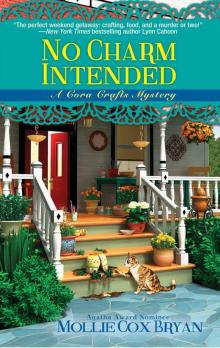 No Charm Intended
No Charm Intended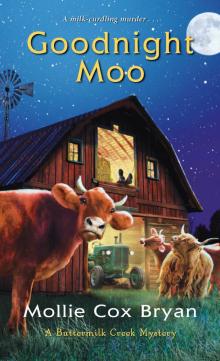 Goodnight Moo
Goodnight Moo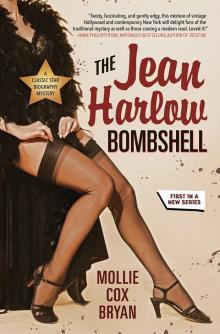 The Jean Harlow Bombshell
The Jean Harlow Bombshell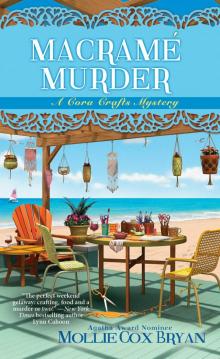 Macramé Murder
Macramé Murder A Crafty Christmas
A Crafty Christmas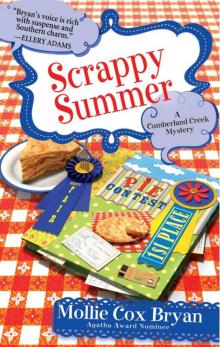 Scrappy Summer
Scrappy Summer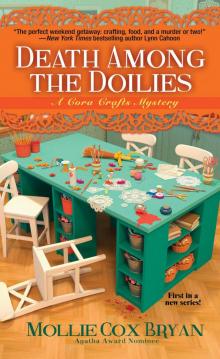 Death Among the Doilies
Death Among the Doilies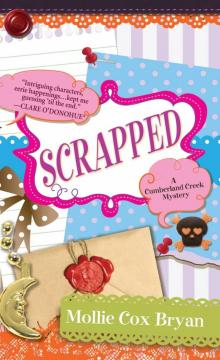 Scrapped
Scrapped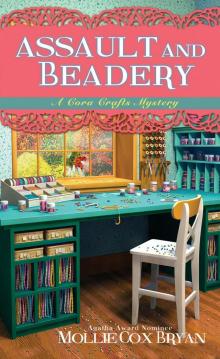 Assault and Beadery
Assault and Beadery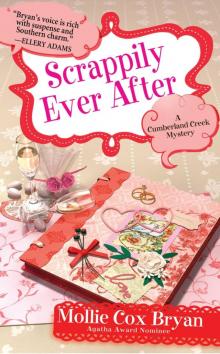 Scrappily Ever After
Scrappily Ever After Scrapbook of Secrets
Scrapbook of Secrets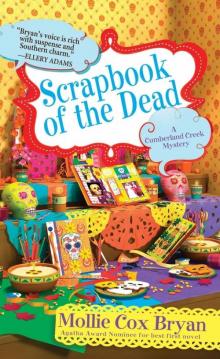 Scrapbook of the Dead
Scrapbook of the Dead